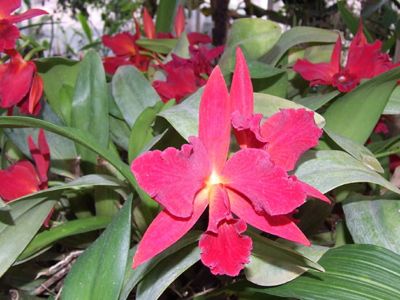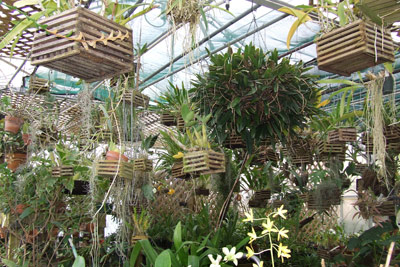Stepping into Ralph Coffey's greenhouse is like being teleported to the Amazonian rain forest. Exotic, bulbous plants with bright blossoms hang from the ceiling, filling every inch of the space. Fans push steamy air around the room, causing the plants to sway gently and fogging the camera lens.

A board member and former president of the Western North Carolina Orchid Society, Coffey relies on massive, carnivorous pitcher plants (which resemble curvy green vases suspended from thin, wiry vines) to keep white fly and mite populations in check and help maintain a pesticide-free environment. But with "Swamped With Orchids," the society's annual show, fast approaching (see box), Coffey's thoughts are consumed by orchids.
Mountain Xpress: What makes these plants so unique?
Ralph Coffey: Orchids are the most diverse plant kingdom in the world. There are more orchid species than any other type of plant, and they grow on every continent except for Antarctica. What's happened over the last 30 years is a lot of hybridizing, so [there are] a lot of simple easy-to-grow orchids available.
Beautiful orchids are sold for $17. These are Phalanopsis (moth orchid): They have long spikes and flat flowers that range from whites to purples to yellows, and they bloom for three to four months. And when they're not blooming, you treat them just like houseplants.
When you say "treat them just like houseplants," what does that mean?
It depends on the species. Some you don't ever let dry out, like the Lady Slippers, and then there are others, like Cattleyas and Dendrobiums, that do like to dry out. The basic thing I always tell people is that if you buy something that's more exotic, then it's important to know what it is, because orchids have certain requirements — light, water, air movement, fertilizer, humidity and repotting — that go into creating the ideal conditions.

Are there any myths about orchids that you want to debunk?
A lot of people tend to think that orchids are delicate. I notice that in my greenhouse, I'll be demonstrating and touching the flowers, and I always get this reaction: 'Oh, I didn't know you could touch them.' Orchids are pretty tough, and there are a number you can grow in the home now.
How did you get started growing orchids?
I had a brother-in-law that gave me a couple of orchids about 25 years ago. I lived fairly close to an orchid nursery, so I used to go out there and follow the owner around and ask questions. Joining the local orchid society is the best way to familiarize yourself with [plant] requirements, and it's a good way to acquire plants and ask questions.
How many plants do you own?
I've got over 1,000 orchids. When I moved to Asheville I had about 350. The nature of being a plant geek and collector is that there's always something to experiment with. I've probably got at least 300 different species.
What advice would you give first-time orchid owners?
Know what you're getting. I think that's why orchids have a bad name, because you'll buy something that's doomed for failure, because you can't give it the environment it needs.
What's your favorite species?
My favorite type of orchid is the Dendrobium. I have one in the greenhouse that's about 4 or 5 feet across. It blooms every June and has as many as 300 to 400 flowers on it at one time.
What's fascinating about orchids also is that in the jungles and temperate zones, they're still discovering new species daily. One that comes to mind is a type of Phragmipedium discovered in Peru about six or seven years ago. It's got an 8-inch, orange-red flower, and now that it's been legally brought (by seed) into the country, hybridizers are using that parent to create a whole new breed of orchids.
To view a photo gallery of Coffey's greenhouse, go to mountainx.com/gallery. A video of Coffey with his favorite blossoming orchid accompanies the online story at mountainx.com.
To learn more about the WNC Orchid Society, go to wncos.org.
Swamped with Orchids
The ninth annual Western North Carolina Orchid Society show happens Saturday, March 27, and Sunday, March 28, from 10 a.m. to 5 p.m. at The North Carolina Arboretum. Admission is free, but parking is $8. For details, go to ncarboretum.org or call 665-2492.
Aiyanna Sezak-Blatt can be reached at asezakblatt@mountainx.com or at 251-1333, ext. 110.



Before you comment
The comments section is here to provide a platform for civil dialogue on the issues we face together as a local community. Xpress is committed to offering this platform for all voices, but when the tone of the discussion gets nasty or strays off topic, we believe many people choose not to participate. Xpress editors are determined to moderate comments to ensure a constructive interchange is maintained. All comments judged not to be in keeping with the spirit of civil discourse will be removed and repeat violators will be banned. See here for our terms of service. Thank you for being part of this effort to promote respectful discussion.